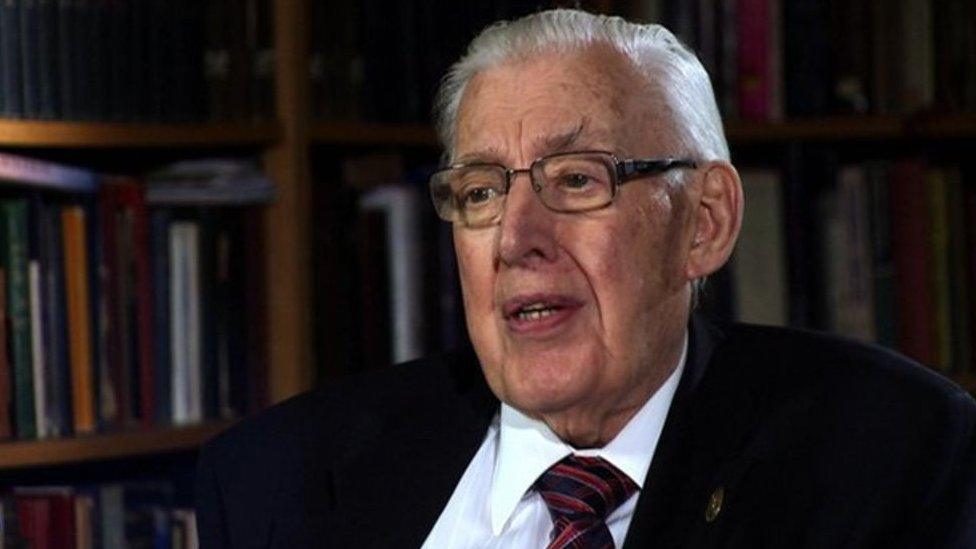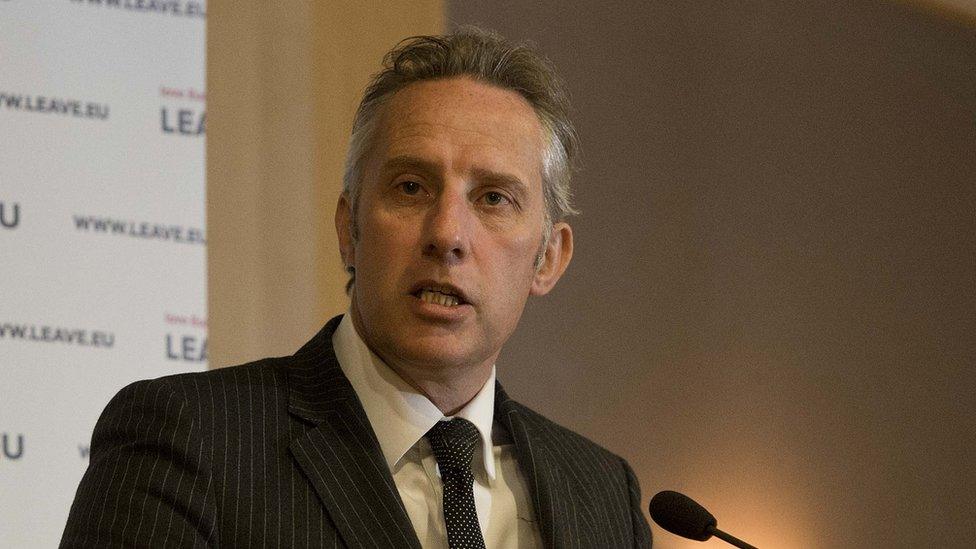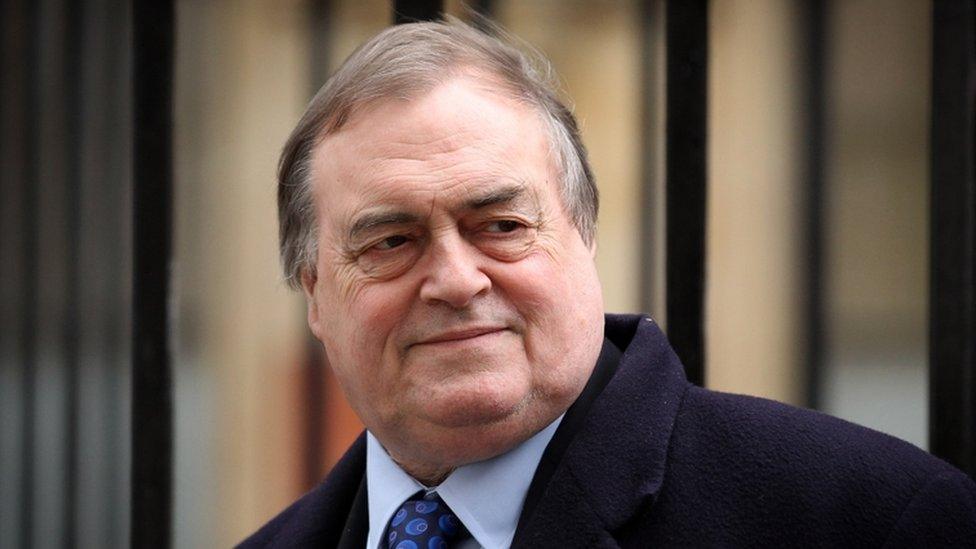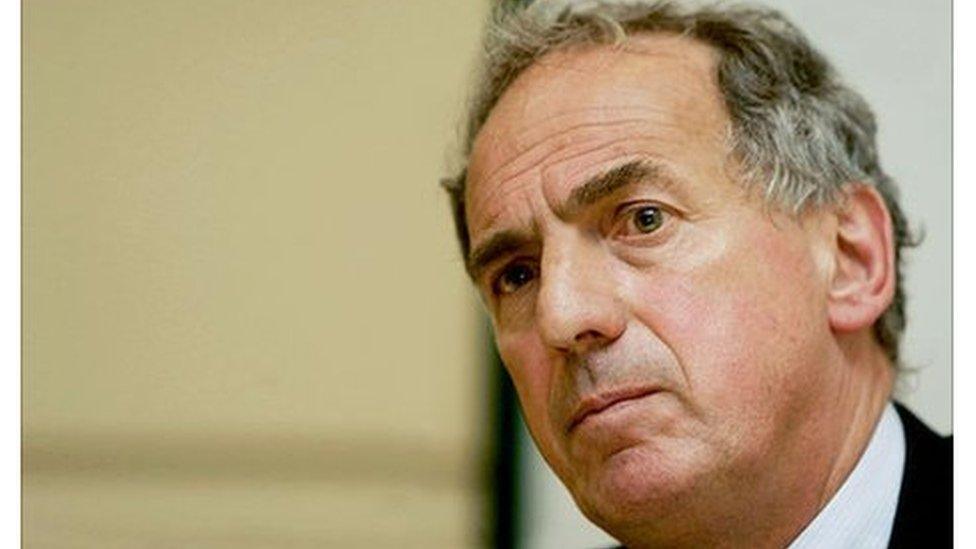Ian Paisley 'to raise bugging of father's phone in parliament'
- Published

John Prescott says that he was told in 2005 that Ian Paisley's phone had been tapped
DUP MP Ian Paisley jr has said he intends to raise the bugging of his father's phone when parliament reconvenes later this month.
Former deputy prime minister John Prescott said Mr Paisley sr's phone was bugged in his Sunday Mirror column, external.
He said he was told of the tap on the former DUP leader's phone by then prime minister Tony Blair in 2005.
Former Labour MP Kim Howells has called on Lord Prescott to clarify when, exactly, the alleged tapping happened.
North Antrim MP Ian Paisley jr said his father would always have been careful when speaking on the phone.
"It would have been something that he would have been aware of, because people would have said to him 'be careful with your phone, it's being listened to'," he told BBC NI's Sunday News programme.
"Finding out who was listening to it is, of course, a different matter, but the suspicion was always there that it was the security services.

Ian Paisley jr said he would not let the matter rest
"For MI5 or MI6 to be engaged in doing that at the behest of the British prime minister is frankly wrong and now that it's been confirmed by John Prescott, the number two in the government, I think that his government needs to be held to account."
He added: "I certainly intend, by way of a point of order, to raise this in parliament on the 18th of April, when parliament reconvenes - I'm not going to let this rest."
Mr Paisley sr, who went on to become first minister of Northern Ireland, died in 2014.
Wilson Doctrine
Prime Minister Harold Wilson introduced the Wilson Doctrine in 1966, which ruled that MPs' communications must not be intercepted by the police and security services.
If an MP was tapped, the prime minister would have to tell parliament.
Writing in his Sunday Mirror column, Mr Prescott said: "In 2005, when I was deputy PM, I was told by Tony Blair an MP had been tapped in the past without parliament being told.

Mr Prescott said parliament was not told of the bugging
"I asked him who it was and he told me the MP was the Rev Ian Paisley.
"Downing Street had been told by the interception of communications commissioner, who wanted to name Paisley.
"Tony asked me to discuss the Wilson Doctrine with the speaker of the House of Commons.
"I never told him (the speaker) that an MP had been tapped or that it was Paisley."
Mr Prescott declined to be interviewed by the BBC.
Former Labour MP Kim Howells who was chair of the Intelligence and Security Committee at Westminster from Autumn 2008 until his retirement in 2010, told the BBC's Good Morning Ulster that questions needed to be asked and, if necessary, these should be put to whoever was prime minister at the time of the alleged tapping.

Mr Howells called on Lord Prescott to be clear about when the alleged phone tapping took place
"I'm not surprised that Ian Paisley wants to know the truth. The country needs the truth as well," Mr Howells said.
"If it is true that phone tapping was going on, then Parliament should have been informed about it."
Mr Howells said phone tapping is allowed if the person who is being watched or listened to is considered to be a threat to national security. I'm not aware that Rev Ian Paisley - I assume in the 2000s - was regarded as a threat to national security."
He said Lord Prescott should make things clear.
"If there isn't a clear answer very quickly, then there ought to be questions posed to whom ever was the person responsible for doing this at the time and that would be a prime minister.
"Rev Ian Paisley was a prominent figure in British politics. I think the prime minister would have to say yes his phone was tapped or no his phone wasn't.
"This is about trust in the end between the elected government, the executive and the intelligence services.
"The intelligence services don't want to be branded by these conspiracy theory lunatics as some kind of shady alternative government.
"They operate within the law and they will want to be quite clear to all MPs now and to those who served in the past that they weren't objects of surveillance and they weren't being spied upon throughout their political careers."